Prominent Cleric Slams Exclusion of Sunni Politician From Iran's Presidential Race
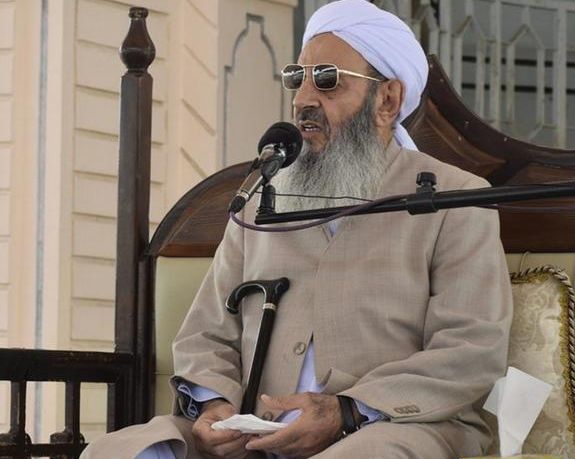
Iran’s Sunni leader Mowlavi Abdolhamid spoke out against the exclusion of a prominent Sunni figure from the presidential race.

Iran’s Sunni leader Mowlavi Abdolhamid spoke out against the exclusion of a prominent Sunni figure from the presidential race.
A vocal critic of the government's ineffectiveness and systemic discrimination, he blasted the rejection of the Sunni candidate as a sign for the lack of progress toward inclusivity within the establishment.
During his Friday prayer sermons in Zahedan, the provincial capital of Sistan-Baluchestan, he emphasized that "policy changes and improved coordination among governing bodies are necessary to make the president's actions effective and avoid repetitive outcomes."
Jalal Jalalizadeh, a Sunni former representative of Sanandaj in the Iranian parliament, was blocked from running in the elections.
The unelected 12-member Guardian Council, responsible for vetting candidates, approved only six out of over 80 who applied to run, disqualifying prominent figures such as former parliament speaker Ali Larijani and former president Mahmoud Ahmadinejad.
Iran is preparing for snap presidential elections following the death of President Ebrahim Raisi in a helicopter crash on May 19. Vice President Mohammad Mokhber currently serves as the acting president.
As Iran's most prominent Sunni cleric, Abdolhamid has consistently criticized the regime for its discriminatory policies against the Sunni population in political and social spheres.
Sunni Muslims make up around 10 percent of Iran's 88 million people, with many facing economic and political marginalization. They are primarily concentrated in border regions spanning from Sistan-Baluchestan in the southeast to Kurdistan in the northwest.
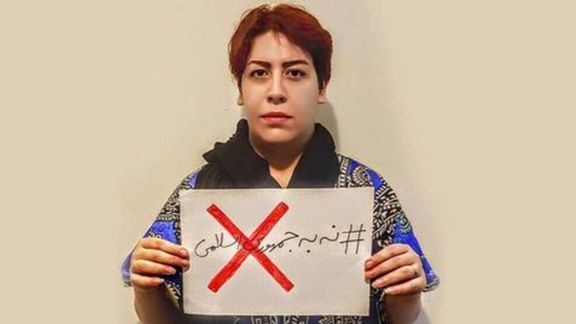
Nobel Peace Laureate Narges Mohammadi has issued a warning about the deteriorating health of fellow inmate Rezvaneh Khanbeigi, who is in her second trimester of pregnancy.
In a letter from Evin Prison on Friday, Mohammadi detailed the severe conditions faced by Khanbeigi and other prisoners, calling for urgent attention to their plight.
Khanbeigi, who is 21 weeks pregnant, is reportedly experiencing serious health issues, including blood pressure fluctuations and heart palpitations.
“Inadequate nutrition, lack of necessary medical facilities, and the overall closed, tense, and stressful prison environment have made us increasingly concerned for her and her unborn child’s health,” Mohammadi stated in her letter.
Evin Prison's women's ward is gripped by unprecedented overcrowding, according to Mohammadi. “All rooms and beds are full. The number of critically ill and incurable patients is so high that the ward can't provide adequate care,” she wrote. Despite the release of some inmates, the population remains above 65.
In recent months, two prisoners who were previously released on medical grounds have been returned to prison without explanation. Now, the ward also houses pregnant women, including Khanbeigi, whose husband, Behfar Lalehzari, is also imprisoned nearby. “This is the third time Rezvaneh has been imprisoned in recent years, and this time she is accompanied by a daughter,” Mohammadi noted.
Khanbeigi and her husband Lalehzari are currently serving a five year sentence each: 4 years for “assembly and collusion against national security” and an additional year for “propaganda against the regime” according to the activist HRANA news agency.
Mohammadi also condemned the harsh conditions and treatment of prisoners, stating, “The Islamic Republic embodies cruelty and crime in practice. The conditions in the women’s ward of Evin Prison clearly depict a harsh reality. The Islamic Republic, with cruelty, hatred, and callousness, tramples on the rights of prisoners, the sick, mothers, and pregnant women, showing no regard for humanity.”
Earlier in the week, the husband of imprisoned journalist Saba Azarpeik disclosed on X that his wife was hospitalized on Tuesday due to severe bleeding, resulting in the termination of her pregnancy. Ataollah Hafezi further revealed that in February, she lost another fetus at around two months old following a grueling nine-hour court session.
“It seems that whatever concerns the rulers have, they are not worried about humanity, and they fully and completely commit acts of crime,” Mohammadi added.
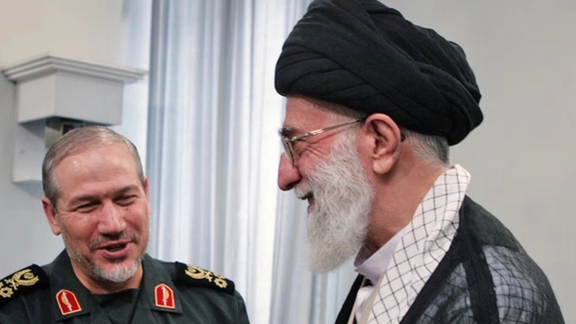
General Yahya Rahim Safavi, Iran’s Supreme Leader's top military advisor, reiterated for the second time in less than a week that the upcoming president must closely follow Ali Khamenei's guidance.
In his remarks on Thursday, he advised people to select a candidate who “considers himself the second person of the country, not the first.”
“The upcoming elections will shape our nation's future, so stay vigilant in selecting leaders committed to unity rather than division. Look for candidates who prioritize serving the nation over personal ambition, capable of effectively managing the country and addressing people's needs,” Safavi said.
He had expressed similar sentiments on Wednesday.
"The president should align with the Supreme Leader’s views, acknowledging himself as second in command,” he said, stressing that “it creates issues if the head of the executive branch doesn't adhere to this hierarchy.”
Following the death of President Ebrahim Raisi and his delegation in a helicopter crash last month, there will be a snap election held on June 28.
Safavi's comments reflect Iran's leaders' efforts to centralize power around a unified ideology, particularly amidst growing internal unrest and external pressures. With his background as the former head of the Revolutionary Guards, his words carry significant influence, underscoring the military's pivotal role in shaping and safeguarding Iran's political sphere.
It's uncertain whom Safavi refers to, but the six candidates chosen by the Guardian Council are notably similar, with all but one having an ultraconservative background.
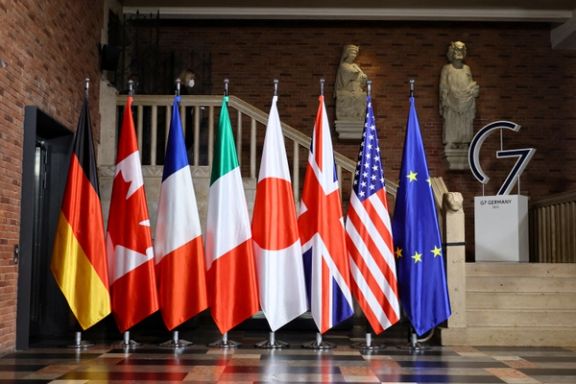
The Group of Seven leaders warned Iran on Friday against advancing its nuclear enrichment program, adding they would be ready to enforce new measures if Tehran were to transfer ballistic missiles to Russia.
"We urge Tehran to cease and reverse nuclear escalations, and stop the continuing uranium enrichment activities that have no credible civilian justifications," according to a draft communique.
Iran has rapidly installed extra uranium-enriching centrifuges at its Fordow site and begun setting up others, a UN nuclear watchdog report said on Thursday.
Iran is now enriching uranium to up to 60% purity, close to the 90% of weapons grade, and has enough material enriched to that level, if enriched further, for three nuclear weapons, according to an IAEA yardstick.
"Iran must engage in serious dialogue and provide convincing assurances that its nuclear program is exclusively peaceful, in full cooperation and compliance with the IAEA’s monitoring and verification mechanism, including the Board of Governors’ resolution of 5 June," the G7 said.
Iran says its nuclear program is solely for peaceful purposes.
The leaders also warned Iran about concluding a deal to send ballistic missiles to Russia that would help it in its war against Ukraine, saying they were prepared to respond with significant measures if it were to happen.
"We call on Iran to stop assisting Russia’s war in Ukraine and not to transfer ballistic missiles and related technology, as this would represent a substantive material escalation and a direct threat to European security," they said.
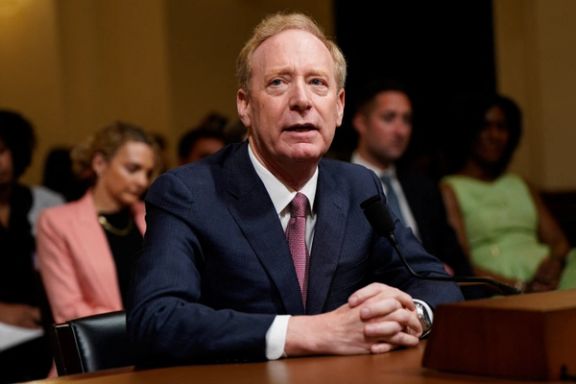
Microsoft President Brad Smith revealed on Thursday that the company detects around 300 million cyberattacks targeting its customers daily, with a majority originating from China, Iran, North Korea and Russia.
Smith spent over three hours addressing inquiries from the House Committee on Homeland Security in Washington, emphasizing the integration of cybersecurity into Microsoft's core values.
During the session, members of the US Congress pressed Microsoft to account for lapses that allowed a Chinese hacking group to breach the emails of senior US officials.
Smith emphasized that simply improving Microsoft's defenses won't be enough, citing the growing expertise and aggressiveness of adversaries from North Korea, Russia, China, and Iran.
“Improving Microsoft alone will not suffice. We are facing formidable adversaries in North Korea, Russia, China, and Iran, who are becoming more skilled and aggressive,” Smith told the committee.
“We should anticipate their collaboration. Their attacks are increasing at an extraordinary rate,” he added.
According to the US Cybersecurity and Infrastructure Security Agency (CISA) 2023 Annual Threat Assessment, Iran poses a significant cyber threat. The report cited Iran's growing cyber capabilities and its penchant for aggressive cyber operations targeting US and allied networks and data.
Over the past several years, Iranian cyber attacks, mainly from Revolutionary Guard-affiliated individuals or entities, have targeted critical infrastructure, financial institutions, election websites, and water plants in the US.
Following the Israel-Hamas conflict, Iran-backed hackers have intensified their activities. According to CrowdStrike, an American cybersecurity company, during the latter half of 2023, there was a noticeable increase in cyber operations by Iran-related groups and Middle East hacktivists, aligning with the events of the conflict.
In April 2023, the US pressed charges and imposed sanctions on Iranians associated with the Revolutionary Guard cyber command for a multi-year cyber campaign aimed at American companies.
In December, the US announced that the Islamic Revolutionary Guard Corps (IRGC) conducted cyber-attacks on American water plants. Subsequently, individuals involved were sanctioned. "The deliberate targeting of critical infrastructure by Iranian cyber actors is an unconscionable and dangerous act," stated Brian Nelson, Under Secretary of the Treasury for Terrorism and Financial Intelligence, announcing the sanctions.
Additionally, Microsoft's Threat Analysis Center (MTAC) observed in November that Iran, Russia, and China are likely to attempt to influence elections in the US and other nations in 2024.
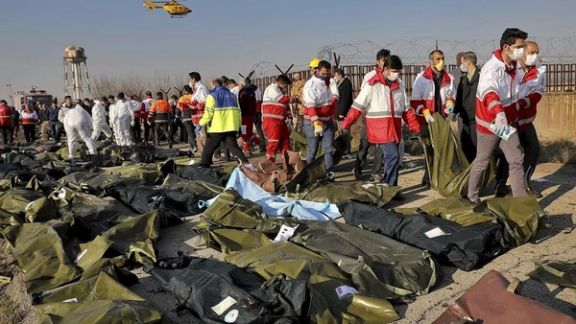
Navaz Ebrahim, who lost her sister and brother-in-law on the Ukraine International Airlines flight that was shot down in Tehran in 2020, said a recent Ontario court ruling is being used by Iran's cyber army to create misinformation and lies.
A court in Ontario earlier this week found that Ukraine International Airlines failed in its duty to cancel flight PS752 in 2020 that took off from Tehran amid military activity and was downed by the IRGC killing 176. On January 8, 2020, as Iran fired ballistic missiles at US bases in Iraq, flight PS752 took off from Tehran and minutes later was shot down by two missiles.
"Lies are spreading," said Ebrahim, who is also the president of the Association of Families of Flight PS752 Victims.
"It seems to be systematic. A lot of it coming from the Islamic Republic," she said.
There have also been a lot of accusations on social media that suing the Ukrainian airline helps the Islamic Republic to cover its tracks and lessen its guilt and responsibility.
Ebrahim said "this court ruling does not diminish in any way, the IRGC’s and the Islamic Regime’s responsibility in the downing of flight PS752 but further emphasizes it.
State media in Iran, for example, has claimed that the ruling shows the Ukrainian airline is responsible, which is incorrect.
Ebrahim said Monday's court ruling was significant and actually helped the families in their fight to get to the truth.
"It was actually very emotional to hear how much they [Ukrainian Airlines] did not follow even basic, safety protocols that night. That's not lifting the responsibility off of the Islamic Republic of Iran and the IRGC shoulders in any way," said Ebrahim.
In March 2021, Iran's civil aviation authority report concluded that the Boeing 737-800 passenger plane was shot down accidentally after being "misidentified" by an air defense unit as a "hostile target" but Monday's ruling referred to Iran's human error claims as "implausible."
"Given the capabilities of the SAM system, the Iranian explanation of human error is implausible," the court ruling stated.
Ebrahim called Iran the 'perpetrators' who shot down the flight on January 8, 2020 killing all 176 people on board.
The Ontario court ruling that Ukraine International Airlines failed in its duty to cancel flight PS752 in 2020 does not absolve Iran, and is not about monetary compensation, said Paul Miller, one of the lawyers representing the PS752 families.
Just 10 minutes before the trail began, Miller contacted his wife, because he was overcome with emotion.
It's a unique case, unlike any other, he told Iran International.
"There was probably 15 to 20 people in the courtroom, family members, and they were all wearing pins with the faces of family members who died. And that brings it very real, you know, a very different way. And it became a very emotional trial," said Miller.
Several families of PS752 victims have told Iran International that they have endured bullying and harassment on social media after the verdict on the Ukrainian airlines came through.
For their protection and to prevent further bullying, they have decided not to speak out, but wanted the public to know that this case is not about money, and is just one step in their journey towards justice.
The backlash received by several PS752 families over this court judgement, Miller said is horrific and misguided.
He stated that the majority of victims of PS752 were highly educated and accomplished. At least 19 universities in six provinces lost researchers, professors and students after the Islamic Revolutionary Guard Corps (IRGC) shot down the passenger plane.
Many of the victims, he said, were breadwinners of their families.
There was a total of 138 passengers that were part of this specific lawsuit, according to Miller. The ruling states that under the Montreal Convention, UIA cannot limit compensation to $180,000 USD per passenger but must pay full compensatory damages, which Miller said is up to 230,000 dollars per family.
"It's absolutely crucial that families get that compensation so that they can manage and not have financial stress going forward. This is trying to make life easier for people who have endured one of the most horrific events possible," said Miller.
David Matas, a legal advisor to the Association of the Families of the Victims of PS752, said the families are not about compensation, and are trying to find out what happened in their quest for justice.
Matas said the judgement by the Ontario court does not prove the Ukrainian airlines was negligent, rather the case he said only shows that the airline can't prove that it wasn't negligent under the Montreal Convention.
"Because of the wording the Montreal convention, the Ukrainian airline had to prove that they were not negligent. In other words, instead of the prosecution proven guilt, the defendant had to prove innocence," explained Matas, an international human right lawyer, on the case.
Matas, who is a senior fellow at the Raoul Wallenberg Centre for Human Rights, said Iran is covering up its own responsibility.
Iran has prevented an independent investigation from taking place. On January 14, 2020, Iran promised to investigate the attack, but they have not shared details about their investigations, and they did not show key evidence to Ukraine or other countries whose citizens were killed.
The judge made it clear that this judgement does not absolve the IRGC from responsibility in the downing of the aircraft. The Ontario Superior Court of Justice earlier labeled the missile strike by the IRGC as "terrorist activity" and dismissed claims by Iran that the downing was a mere "human error."
The judgement on Monday found, that despite the IRGC's deliberate firing of two missiles at the airliner, the company could not prove that it acted according to standards to cancel the flight amid potential military activities in the early hours of January 8, 2020.
Miller said he and the rest of the legal team consider the PS752 families to be "special" and that they will never "forget" them. As for the Islamic Republic of Iran, Miller said he "I just can't fathom. Your country. The country you came from killed your family."
The families of PS752 victims, like Ebrahim, want the online bullying to stop.
"It's just very difficult and emotional for the families. It's not easy to be attacked and to listen to all the lies and misinformation," she said.